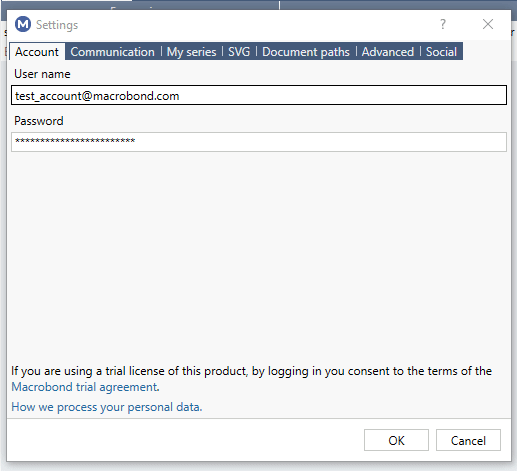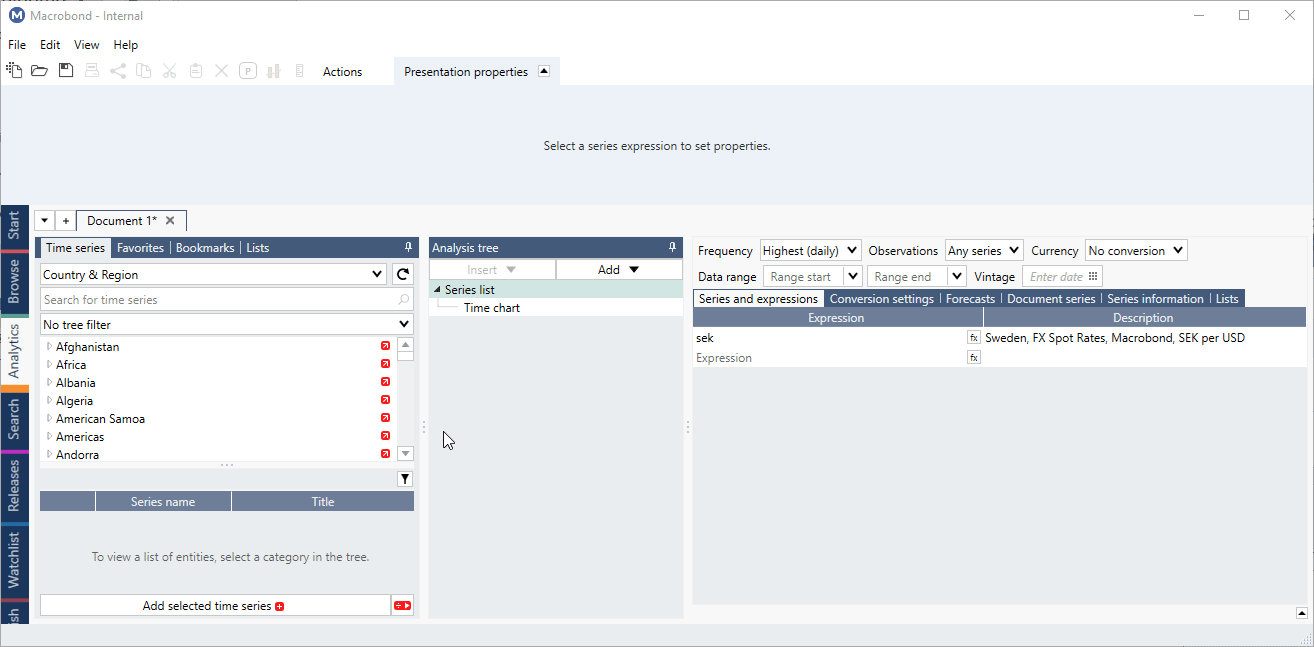- Introduction
- Requirements
- Enabling the Bloomberg Connector
- Working with Bloomberg Connector
- Troubleshooting
Introduction
With the Macrobond Bloomberg Connector you can retrieve historical time series from Bloomberg if Bloomberg Terminal is installed and running on your computer.
The application determines the start date and frequency automatically. The highest supported frequency is daily data, and the earliest start date is 1930-01-01.
Requirements
Please note that the product Bloomberg Anywhere, which is a lightweight version of Bloomberg Terminal, does not come with the API needed by the Macrobond Bloomberg Connector. You need to run the installed version of Bloomberg Terminal for the connector to work.
Enabling the Bloomberg Connector
To be able to use the Bloomberg connector, it must be enabled in the Macrobond application. This is done on the Configuration (in upper menu) > Settings > tab 'My series':

Working with Bloomberg Connector
Entering Bloomberg symbols in the Series browser
Navigate to Browse tab and select 'Bloomberg' in the Series browser.
Note this is not a search bar, it's best to enter full symbol i.e.:
- IBM US EQUITY
- goog us equity
- PSI20 Index
- W Z3 Comdty
If the symbol you specify won't include any of the well-known 'yellow keys' i.e.:
'Govt', 'Corp', 'Mtge', 'M-Mkt', 'Muni', 'Pfd', 'Equity', 'Comdty', 'Index', 'Curncy', 'Client',
we will try to append them and display if any of them works.

You can also paste Bloomberg Excel =BDH expressions, i.e.:
=BDH("SAP GR Equity","BEST_PE_RATIO","20050101","","BEST_FPERIOD_OVERRIDE=1GY","per=M")
and the application will suggest a code which will work in Macrobond (in this case: "ih:bl:SAP GR Equity:BEST_PE_RATIO:BEST_FPERIOD_OVERRIDE=1GY").
Note that this won't work for =BDP or =BDS queries.
Series names
Series names for the Bloomberg connector, in their simplest form, are specified as "ih:bl:symbol". Note, if the BBG symbol has ' : ' in it (i.e., CL 1 N:00_0_N_Comdty) should be written as"ih:bl:c 5 a::00_0_N Comdty:PX_LAST", with two colons inside symbol.
The symbol is a Bloomberg symbol. The default format for Bloomberg symbols is the Bloomberg ticker followed by the 'yellow key'. An example of a Bloomberg symbol is IBM US Equity and the series name to enter in Macrobond would then be "ih:bl:IBM US Equity". When you use this as a series name in the Series List you need to specify the quotes around the name since it contains spaces.
A name without a specific field specified will refer to the field PX_LAST. The full format of the name is "ih:bl:symbol:field:override1=value1:override2=value2", where the field and the list of overrides are optional.
Here is an example the uses another field than PX_LAST: "ih:bl:IBM US Equity:BEST_EPS".
You may optionally append one or more 'overrides' to the name. For example: "ih:bl:nky Index:BEST_PE_RATIO:eqy_consolidated=N".
Bloomberg have some variations on their symbol codes. For instance, you can include the pricing source as in "ih:bl:MSFT@ETPX US Equity".
Please consult the Bloomberg documentation for further information on the symbol format, field names and overrides.
CUSIP/ISIN
Instead of code use security name. We recommend using lower cases. Coupon, if used, should be in decimals. You may also use other symbol schemas than the Bloomberg ticker format. For example: "ih:bl:/cusip/912828GM6@BGN".
Please consult the Bloomberg documentation for further information on the symbol format, field names and overrides.
Series variations (field codes)
If you want some other field than PX_LAST - which is a standard series - you may include it like in this example:
"ih:bl:SHCOMP Index:PX_ASK"
You can also find below a non-exhaustive list of Bloomberg field codes:
| Ask Price | PX_ASK |
| Bid Price | PX_BID |
| High Price | PX_HIGH |
| Last trade/Last price | LAST_PRICE |
| Low Price | PX_LOW |
| Mid Price | PX_MID |
| Open Price | PX_OPEN |
| Option Price | OPT_PX |
| Settlement Price | PX_SETTLE |
| Strike Price | STRIKE_PX |
| Best EV/EBITDA | TO_EBITDA |
| Best P/E Ratio | PE_RATIO |
| Closing Price 1 Day Ago | CLOSE_1D |
| Contract value | CONTRACT_VALUE |
| Current Enterprise Value | ENTP_VAL |
| Enterprise Value | ENTERPRISE_VALUE |
| Enterprise Value (EV) to Book Value | BOOK_VALUE |
| Estimated P/E Nest Year Aggregate | YR_AGGTE |
| Net Asset Value (NAV) | ASSET_VAL |
| Price to Book Ratio | BOOK_RATIO |
| P/E ratio | PE_RATIO |
| Total market Value TOT_MKT_VAL | MKT_VAL |
| Volume | VOLUME |
| Volatility 30 day | VOLATILITY_30D |
| VWAP (Vol Weighted Average Price) | AVG_PX |
| Yesterday Close Price | YEST_CLOSE |
Using Bloomberg 'overrides'
Bloomberg has a system for specifying additional parameters in historical data requests that can affect the series returned. An override can look like this: Eqy_Consolidated=N.
As explained above you can specify such overrides when writing the series names in Macrobond. These the same overrides as you can specify in the Bloomberg BDH Excel function. In the BDH function there are, however, some parameters that look like 'overrides', but they are technically not. Some of these are also supported in the Macrobond application:
QtTyp |
Price/Yield quote. Valid values are “P” (price) and “Y” (yield). The default is “Y”. |
Quote |
Quote calculation. Valid values are “A” (average) and “C” (close). The default is “C”. |
CshAdjNormal |
Cash Adjustment Normal. Valid values are “Y” (yes) and “N” (no). The default is “N”. |
CshAdjAbnormal |
Cash Adjustment Abnormal. Valid values are “Y” (yes) and “N” (no). The default is “N”. |
CapChg |
Capital Changes. Valid values are “Y” (yes) and “N” (no). The default is “N”. |
Curr |
Currency conversion. Valid values are ISO codes such as “USD” and “GBP”. |
Per |
Period adjustment. "AD" (actual daily), "D" (daily), "W" (weekly), "M" (monthly), "AQ" (actual quarterly), "Q" (quarterly), "AS" (actual semi-annually), "S" (semi-annually), "AY" (actual annually), "FY" (fiscal annually), "Y" (annually) |
CDR |
Calendar code |
EndDate |
End date on the form yyyyMMdd |
The whole formula would look like "ih:bl:BARC LN Equity:CUR_MKT_CAP:Curr=USD".
For further details, please see the Bloomberg documentation.
Changing currency or scale
Currency
You can download series in specified currency using override Curr i.e.,:
"ih:bl:ndueacwf index:PX_LAST:Curr=ZAR"
Scale
You can scale series using override SCALING_FORMAT i.e.,:
"ih:bl:AAPL US EQUITY:CUR_MKT_CAP:SCALING_FORMAT=MLN"
K |
Thousands |
MLN |
Millions |
BLN |
Billions |
TRN |
Trillions |
For further details, please see the Bloomberg documentation.
How to work with intra-day data?
The highest frequency in Macrobond is Daily which means you cannot download Bloomberg's data as hourly. However, you can download each hour as a separate in-house series (8:00 each day = one in-house) if needed.
Limitations
Bloomberg does not provide information about scale or unit of data in a consistent way that could be used reliably by Macrobond. Sometimes this information is included in series' title, in other cases – it is absent.
Please check description of series in Bloomberg Terminal and consult Bloomberg’s support to determine if series downloaded to Macrobond has to be manually re-scaled e.g. by multiplying it by 1 000 000 if values are expressed in millions.
Troubleshooting
For errors not specified here, the best approach is to try loading the same series by using the Bloomberg Excel add-in by using the =BDH function. If you cannot load the series using the BDH function, please contact Bloomberg support.
Why I can't copy Time table with BBG series in it?
Bloomberg requests that user must not be able to download raw values of the Bloomberg’s time series through the application. Therefore, copying from Macrobond Time table, with Bloomberg series in it, will give you an error. To obtain the data, please right-click in the analysis tree and use Copy as Excel dataset.
Unknown series prefix
If you get an error like 'Unknown series prefix' when trying to specify a Bloomberg series in the Series list, please verify that the Bloomberg connector has been enabled in Macrobond as described in the section Enabling the Bloomberg connector.
Communicates from Bloomberg Terminal
Monthly limit reached
This is a message from the Bloomberg Terminal - it appears that there is a monthly limit of series that you can pull into Excel (and other applications) per Bloomberg terminal. Please contact Bloomberg support regarding this matter.
Workflow review needed
This is a message from the Bloomberg Terminal - it seems that you won't be able to pull more data via Bloomberg Connector without checking in with them. They have likely looked at your past activity, and deemed it unusual. Please contact Bloomberg support regarding this matter.